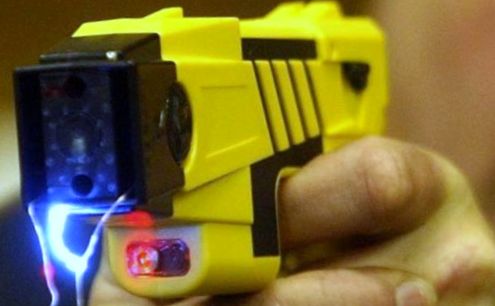BWVs: Survey draws UK map of forces with `separate policies across arbitrary borders`
Police forces have been criticised after a piecemeal picture of inconsistency emerged on whether officers armed with Tasers should wear body cameras.
Sep 3, 2016
By Nick Hudson
Police forces have been criticised after a piecemeal picture of inconsistency emerged on whether officers armed with Tasers should wear body cameras.
Many forces have not completed a full rollout with some reporting there are still technology issues to iron out while others prioritise Taser officers in a conventional role with “separate solutions” for firearms deployment.
At least one has said it has no current plans to equip officers with body-worn video cameras (BWV).
A survey by the Press Association across the UK`s policing service has drawn a map where forces adopt separate policies across “arbitrary borders” in an entirely disjointed approach.
This is in spite of leading calls of support from the National Police Chiefs Council (NPCC) that deployment “maximises transparency and accountability” and chief officers describing the technology as “valuable” and “effective”.
The NPCC and the Home Office have both said the use of BWV is an “operational” decision for each force while the College of Policing argued its support of some of the “most comprehensive” Taser training in the world was through an evolving “development of guidance” aimed at increasing consistency in the level of service to the public.
The issue has been brought into sharp focus following the death of former Pemier League football star Dalian Atkinson after he was Tasered outside his father`s home in Telford, Shropshire, on August 15.
A criminal investigation is under way, but following the 48-year-old`s death it emerged that the officers involved, from West Mercia Police, had not been equipped with BWV.
Mr Atkinson`s family has since called for all Taser-equipped officers to be issued with BWV as standard. Keith Vaz, chairman of the House of Commons Home Affairs Select Committee (HASC) said the “complete lack of consistency” across forces should “raise alarm bells”, especially in light of Mr Atkinson`s death.
The West Mercia force has admitted it does not use BWV routinely and it is looking at its options.
Assistant Chief Constable Amanda Blakeman said the force was “committed to routine use of video recording devices by officers on patrol”.
She added: “It is our intention to find a single solution that meets the needs of patrol officers as well as those who perform specialist roles, including those who routinely carry Taser.
“We are fully aware of NPCC`s guidance on this subject and are working with the national leads for BWV, Taser, pursuit and armed policing.”
Last year, an inquest jury found that the use of a Taser by Greater Manchester Police (GMP) officers had contributed to the death of 23-year-old Jordan Begley from a cardiac arrest in July 2013.
Afterwards, his mother, Dorothy Begley, called for bodycams to be routinely used by police.
The Independent Police Complaints Commission (IPCC) has recently sought a judicial review to overturn its own report into Mr Begley`s death, which initially cleared GMP officers of any wrongdoing.
Separately, following Mr Atkinson`s death, the IPCC has said two West Mercia officers are “under criminal investigation”, having been suspended and issued with gross misconduct notices.
The ex-Aston Villa player`s nephew, Fabian Atkinson, said: “If they have a weapon and they`re going to discharge that weapon, then they need a camera to record that.”
Mr Vaz said: “The complete lack of consistency in the various police forces` approach to body-worn cameras and Taser should raise alarm bells following the tragic death of Dalian Atkinson.


